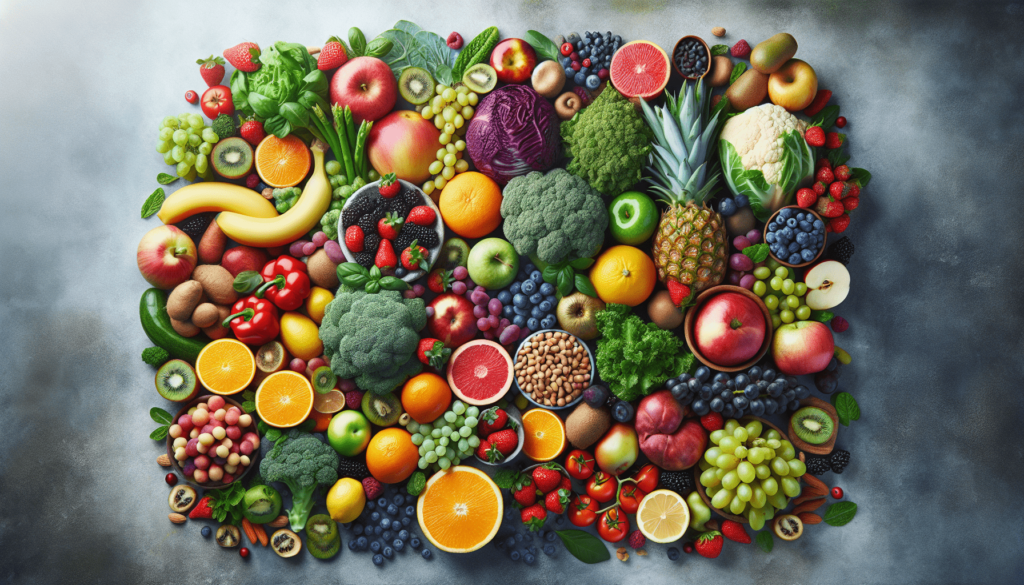If you’ve ever found yourself confused about what exactly qualifies as a healthy food, you’re not alone. With so much conflicting information out there, it’s easy to feel overwhelmed or uncertain about what to eat. In this article, we’ll explore what defines a healthy food and provide you with some simple guidelines to help you make better choices for your overall well-being. Let’s break it down and make healthy eating a little less daunting. What Are Healthy Foods?
What are healthy foods? It’s a question that many people ask themselves daily as they strive to make better choices for their overall well-being. In this article, we will explore the concept of healthy eating, discuss the benefits of consuming nutritious foods, and provide practical tips for incorporating more healthful options into your diet. Let’s dive in!
The Basics of Healthy Eating
When it comes to defining healthy foods, it’s important to consider a variety of factors. Nutrient density, or the amount of essential vitamins, minerals, and other beneficial compounds per calorie, is a key aspect to consider when evaluating the healthfulness of a food. In general, foods that are minimally processed and rich in nutrients are considered to be healthier options.
Eating a balanced diet that includes a variety of whole foods such as fruits, vegetables, whole grains, lean proteins, and healthy fats is essential for supporting overall health and well-being. By focusing on consuming nutrient-dense foods, you can provide your body with the essential nutrients it needs to function optimally and thrive.
Nutrient-Dense Foods
Nutrient-dense foods are those that provide a high amount of essential nutrients relative to the number of calories they contain. These foods are typically rich in vitamins, minerals, fiber, and antioxidants, which are all important for supporting various aspects of health, including immune function, digestion, and heart health.
Incorporating more nutrient-dense foods into your diet can help ensure that you are meeting your body’s nutritional needs and reducing your risk of developing chronic diseases such as heart disease, diabetes, and cancer. Some examples of nutrient-dense foods include leafy greens, berries, nuts and seeds, fish, and whole grains.
Portion Control
In addition to choosing nutrient-dense foods, it’s also important to practice portion control to maintain a healthy weight and prevent overeating. By being mindful of serving sizes and listening to your body’s hunger and fullness cues, you can avoid consuming excess calories and maintain a healthy balance in your diet.
Eating balanced meals that include a mix of proteins, carbohydrates, and fats can help keep you feeling satisfied and energized throughout the day. By focusing on consuming whole foods and paying attention to portion sizes, you can support your overall health and well-being.

Benefits of Healthy Eating
The benefits of healthy eating are numerous and far-reaching. By making smart food choices and prioritizing nutrient-dense options, you can experience improvements in various aspects of your health and quality of life. From increased energy levels to a reduced risk of chronic diseases, the impact of healthy eating on overall well-being cannot be overstated.
Increased Energy Levels
Consuming a diet that is rich in essential nutrients can help boost your energy levels and improve your overall vitality. Nutrient-dense foods provide the fuel your body needs to function optimally, support physical activity, and maintain mental focus throughout the day.
By prioritizing whole foods such as fruits, vegetables, and whole grains, you can stabilize your blood sugar levels and avoid energy crashes associated with consuming sugary or processed foods. Making small changes to your diet, such as incorporating more lean proteins and healthy fats, can help keep you feeling energized and alert throughout the day.
Weight Management
Maintaining a healthy weight is essential for supporting overall health and reducing your risk of chronic diseases such as heart disease, diabetes, and certain types of cancer. By focusing on consuming a balanced diet that includes a variety of nutrient-dense foods, you can manage your weight more effectively and support long-term health.
Incorporating more whole foods and reducing your intake of processed and high-calorie foods can help you achieve and maintain a healthy weight. By practicing portion control and being mindful of your eating habits, you can support your weight management goals and reduce your risk of obesity and related health conditions.
Improved Digestion
Eating a diet that is rich in fiber and essential nutrients is important for supporting healthy digestion and gut function. Fiber-rich foods such as fruits, vegetables, whole grains, and legumes help promote regularity, prevent constipation, and support a healthy microbiome in the gut.
Incorporating more fiber-rich foods into your diet can help improve your digestion, reduce bloating and discomfort, and support overall gut health. By prioritizing fiber-rich foods and drinking plenty of water, you can promote healthy digestion and support optimal nutrient absorption.
Enhanced Immune Function
Consuming a diet that is rich in essential nutrients, vitamins, and antioxidants is crucial for supporting immune function and protecting against illness and infection. Nutrient-dense foods such as fruits, vegetables, nuts, seeds, and lean proteins provide the vitamins and minerals your immune system needs to function optimally.
By incorporating more immune-boosting foods into your diet, you can strengthen your body’s natural defenses and reduce your risk of developing infections and illness. Making smart food choices and prioritizing nutrient-rich options can help support a healthy immune system and overall well-being.

Practical Tips for Healthy Eating
Now that we’ve explored the benefits of healthy eating and the importance of consuming nutrient-dense foods, let’s discuss some practical tips for incorporating more healthful options into your diet. By making small changes to your eating habits and focusing on nutrient-rich foods, you can support your overall health and well-being.
Meal Planning
One of the best ways to ensure that you are eating healthfully is to plan your meals in advance. By taking the time to plan out your meals for the week, you can make sure that you have a variety of nutritious options on hand and reduce the temptation to reach for unhealthy snacks or convenience foods.
Start by creating a weekly meal plan that includes a mix of fruits, vegetables, whole grains, lean proteins, and healthy fats. Make a shopping list based on your meal plan and try to stick to it when you go to the grocery store. By preparing and cooking meals in advance, you can save time and ensure that you have nutritious options available when hunger strikes.
Snack Smart
Snacking can be a healthy part of your diet if you choose nutrient-dense options that provide energy and essential nutrients. Instead of reaching for sugary or processed snacks, opt for whole foods such as fruits, vegetables, nuts, seeds, and yogurt.
Keep healthy snacks on hand at home, at work, and on the go to help you avoid making poor food choices when hunger strikes. By planning ahead and having nutritious snacks readily available, you can support your energy levels, prevent cravings, and avoid overeating at mealtime.
Hydration
Staying hydrated is essential for supporting overall health and well-being. Drinking enough water throughout the day can help maintain proper hydration, support digestion, and regulate body temperature.
Try to drink at least eight glasses of water a day and more if you are physically active or in hot weather. Consider carrying a reusable water bottle with you throughout the day to remind yourself to drink water regularly. By staying hydrated, you can support your energy levels, concentration, and overall health.

Conclusion
In conclusion, healthy foods are those that are nutrient-dense, minimally processed, and rich in essential vitamins, minerals, fiber, and antioxidants. By focusing on consuming a variety of whole foods such as fruits, vegetables, whole grains, lean proteins, and healthy fats, you can support your overall health and well-being.
Benefits of healthy eating include increased energy levels, weight management, improved digestion, and enhanced immune function. By making smart food choices, practicing portion control, and being mindful of your eating habits, you can experience improvements in various aspects of your health and quality of life.
Incorporating practical tips for healthy eating, such as meal planning, smart snacking, and staying hydrated, can help you make better choices for your overall well-being. By prioritizing nutrient-dense foods and making small changes to your diet, you can support your long-term health and enjoy the benefits of a balanced and nutritious diet.


